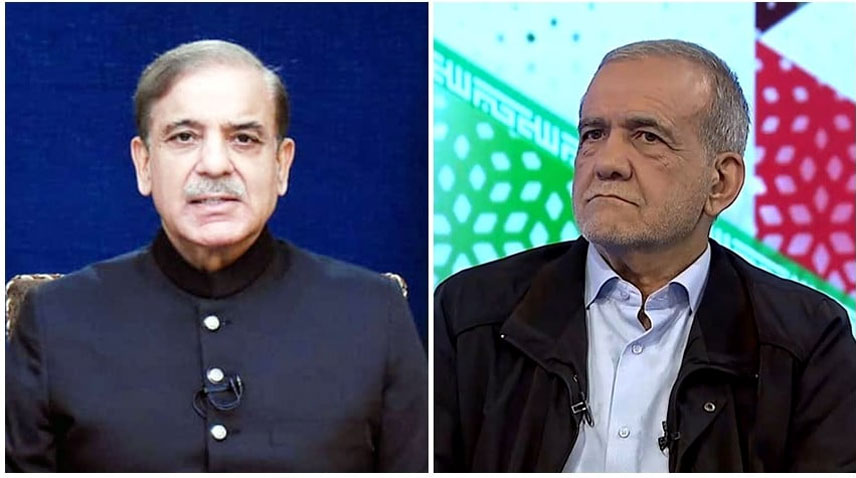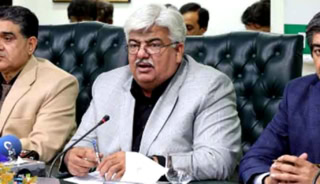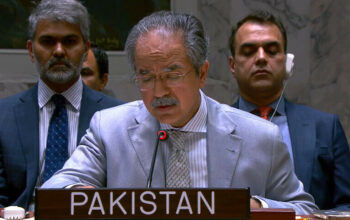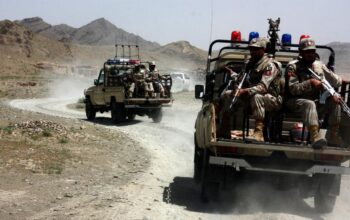By Staff Reporter
ISLAMABAD Prime Minister Shehbaz Sharif on Sunday denounced US airstrikes on Iranian nuclear facilities as a breach of international law, calling for diplomacy to halt escalating tensions among the United States, Israel, and Iran.
In a call with Iranian President Masoud Pezeshkian, Prime Minister Sharif criticized the attacks on facilities under International Atomic Energy Agency oversight. “These attacks constituted a serious violation of international law and the IAEA Statute,” Sharif’s office said.
“While noting Iran’s right to self-defense, as enshrined under Article 51 of the UN Charter, the prime minister stressed the need to immediately return to dialogue and diplomacy as the only viable path forward.”
Sharif also called for urgent collective efforts to de-escalate the situation. “The Prime Minister reiterated Pakistan’s readiness to play a constructive role in this context.”
The US military targeted three Iranian nuclear sites, Fordow, Isfahan, and Natanz, early Sunday, intensifying a conflict that flared in June when Israel struck Iran’s nuclear and military infrastructure. Israel alleges Iran’s nuclear program is nearing weaponization, a charge Tehran rejects, insisting its efforts are peaceful and monitored by international authorities.
Details of the strikes’ scope remain limited, but they have stoked fears of a broader regional conflict. Iran’s Foreign Minister Abbas Araghchi labeled the US action a “major escalation,” claiming Iran’s right to self-defence and signaling an end to diplomatic efforts.
President Donald Trump warned Iran against reprisals, promising a rapid US counteraction.
Sharif’s office said the Prime Minister “conveyed Pakistan’s condemnation of the US attacks, which followed Israel’s unprovoked and unjustified aggression over the past eight days”. “He reaffirmed Pakistan’s unwavering solidarity with the brotherly people and Government of Iran, while expressing heartfelt condolences on the loss of precious lives and prayed for the swift recovery of the injured.”
President Pezeshkian conveyed his appreciation for Pakistan’s support to Iran. “He thanked the Prime Minister, the Government and people of Pakistan, including the military leadership, for standing in solidarity with the people and Government of Iran.”
Earlier, Pakistan’s foreign office had released a strongly worded statement, expressing “grave concern” over the strikes and their potential to inflame the region further.
“Any further escalation of tensions will have severely damaging implications for the region and beyond,” it warned, urging all sides to uphold international humanitarian law, safeguard civilians, and “immediately bring the conflict to an end.” “Recourse to dialogue, diplomacy, in line with the principles and purposes of the UN Charter remains the only viable pathway to resolve the crises in the region.”
Pakistan’s sharp condemnation of US strikes on Iran ordered by President Donald Trump comes just a day after Islamabad had nominated the US President for the Nobel Peace Prize for his role in ending a brief conflict with India.
Pakistan announced Trump’s nomination on Saturday, hailing him as “a genuine peacemaker” whose “great strategic foresight and stellar statesmanship” brought a four-day clash with India to a close last month.
But US bombing raids on Iran overnight have unraveled that stance, prompting outrage and exposing Islamabad to criticism at home and abroad.
Former senator Mushahid Hussain called for the government to “review, rescind and revoke” the nomination.
“President [Trump] has been Trapped by [Israeli PM Benjamin] Netanyahu and the Israeli War Lobby, committing [the] biggest blunder of his presidency,” the former senator wrote on X. “Trump will now end up presiding over [the] decline of America! Since Trump is no longer a potential peacemaker, but a leader who has willfully unleashed an illegal war, [the] Pakistan government must now review, rescind and revoke his Nobel nomination.”
Meanwhile, Russia, China, and Pakistan have jointly proposed a draft UN Security Council resolution demanding an “immediate and unconditional ceasefire” in the Middle East, Reuters reported. Circulated ahead of an emergency UNSC session, the resolution requires at least nine votes in favor and no vetoes from permanent members, the United States, France, Britain, Russia, or China, to pass. The three countries have asked for feedback by Monday evening, though no voting date has been set.
Experts caution that the US strikes could drag Pakistan into a broader conflict with devastating consequences. Economist Shakeel Ramay described the economic implications as “catastrophic,” particularly if Iran follows through on threats to close the Strait of Hormuz, a vital chokepoint through which 20% of global oil and gas flows.
“Most of our oil supplies come from the Middle East,” Ramay said. “A closure would disrupt electricity production and transportation, driving up prices and straining an already fragile economy.”
Iran’s response remains uncertain. On Sunday, Iran’s Press TV reported that parliament had backed closing the strait, but the final call lies with the Supreme National Security Council. Esmail Kosari, a member of parliament’s national security commission, told Iranian media that lawmakers had “come to the conclusion” that closure was warranted, though no formal bill has been confirmed. The threat, long a lever against Western pressure, looms larger after US strikes targeted Iran’s nuclear facilities.
For Pakistan, the stakes are not just economic but strategic. Lt. Gen. (retired) Naeem Lodhi, a former defense secretary, praised Islamabad’s swift condemnation of the attacks and its offer to mediate. “Pakistan has acted wisely so far,” Lodhi told Arab News. “But it must remain alert and ensure no country, on either side, uses its soil, airspace, or assets.” Lodhi stressed that neutrality, though challenging given Pakistan’s proximity to Iran, is the “most desirable course.”
If the conflict widens, Lodhi warned, Pakistan could face “serious challenges.” A defeated Iran might give way to a regime hostile to Islamabad, adding yet another threat along its borders. “Many Pakistanis believe this could create long-term problems,” he said.
The crisis tests Pakistan’s ability to balance ties with Iran, Gulf allies, and the United States, a major trading partner and source of military and economic aid. Lodhi noted that Arab involvement, increasingly likely, could pressure Pakistan to provide logistical support, airspace access, or even bases. “Saying no to the U.S. might be manageable despite its influence,” he said. “Refusing multiple allied Arab countries will be much harder.”
Still, Lodhi expressed confidence in Pakistan’s leadership, particularly its military, to steer clear of entanglement. “They’re well aware of the dangers and will likely strive to keep us out,” he said.
Copyright © 2021 Independent Pakistan | All rights reserved




